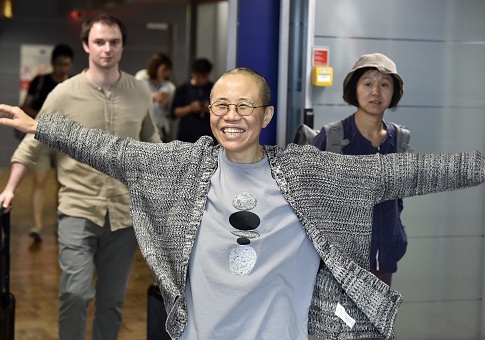The Chinese government has released Liu Xia, the widow of world-renowned poet and political prisoner Liu Xiaobo, from house arrest after renewed international pressure from human rights activists.
She departed Beijing overnight and is traveling to Berlin, according to her attorney, Jared Genser, who credited President Trump, German Chancellor Angela Merkel, "and so many others in the international community who helped make today possible."
Liu Xia is the widow of the late Chinese Nobel Peace Prize Laureate Liu Xiaobo, China's most prominent political prisoner. Liu Xiaobo was a writer and a poet imprisoned for advocating for broad political reforms and greater human rights in China.
He was first imprisoned in connection with the violently quashed 1989 Tiananmen Square pro-democracy protests and won the Nobel Peace Prize in 2010 for his writings during his final 11-year-sentence.
He died last summer of late-term liver cancer after the Chinese government repeatedly denied his request to receive medical treatment abroad.
After his death, human rights activists, as well as several U.S. lawmakers, expressed deep concern for Liu Xia's fate and livelihood and called on the Chinese government to release her from house arrest, which she had been confined and isolated for eight years.
"Liu Xia was never a political person, and yet, for almost eight years enormous misery was heaped upon her by Chinese authorities for the crime of merely having married her husband," Genser said in a statement Tuesday.
Genser also urged the Chinese government to free Liu Xia's brother, Liu Hui, who remains in China.
"While Liu Xia is free, our work is not complete," he said. "Until [her brother] is able to leave China to be reunited with his sister, Liu Xia will remain a hostage of the Chinese government."
Sen. Ted Cruz, (R., Texas), who has advocated for the release of Liu Xia and her late husband, hailed her release, saying it was long overdue.
"Liu Xia is finally free and today the world celebrates her enjoyment of the liberties that were rightfully hers all along," he said.
"The lesson of Liu Xia and her courageous husband, the late Nobel Peace Prize winner Liu Xiaobo, who was murdered by the Communist Chinese regime, is simple yet powerful: darkness fears light and mendacity fears truth, so tyrants cannot tolerate either," he continued.
He pledged to continue "to shine a light on the Communist regime's abuses" and urged Chinese President Xi Jinping to release the thousands of political prisoners who remain jailed or cannot leave China, including Liu Xia's brother Liu Hui.
Cruz previously authored a resolution honoring the life and work of Liu Xiaobo and in July of last year, as well as the fall of 2015, delivered speeches calling attention to Liu's plight. He also has introduced a bill to rename the street in front of the Chinese embassy in Washington "Liu Xiaobo Plaza."
U.S. and German officials have pushed hard for Liu Xia's release, with Trump and Merkel separately raising the issue privately several times to the Chinese president, according to knowledgeable sources.
Several well-known human rights activists and international humanitarian organizations have condemned the Chinese government's treatment of Liu Xia.
Most recently, on July 4, 2018, several United Nations human rights experts published a statement reiterating their call for the Chinese government to immediately release her, saying they were deeply concerned about her mental health.
"We are disturbed by reports of the deteriorating health of Liu Xia. She is reportedly physically restricted at an unknown location and suffers from severe psychological distress," the experts said, referring to several recent audio recordings that were released in May in which she pleads for help.
"We understand her condition has been aggravated by the restrictions placed on her movements, and contact with outsiders, for over seven years, while she has not been accused of any criminal activity, nor charged with any criminal offence."
Those who signed the statement included: Bernard Duhaime, chair-rapporteur of the U.N. Working Group on Enforced or Involuntary Disappearances; Seong-Phil Hong, chair-rapporteur of the U.N. Working Group on Arbitrary Detention; and Michel Forst, the special rapporteur on the situation of human rights defenders. The statement was also endorsed by David Kaye, special rapporteur on the promotion and protection of freedom of opinion and expression.
The special rapporteurs and working groups are part of what is known as the Special Procedures of the U.N. Human Rights Council. Special Procedures, the largest body of independent experts in the U.N. human rights system, is the general name of the independent fact-finding and monitoring mechanisms of the Human Rights Council, which address either specific country situations or thematic issues in all parts of the world.
Last summer before Liu Xiaobo's death, 154 Nobel Laureates signed a letter sent to the Chinese President Xi Jinping calling for the release of Liu Xia and her husband. On Aug. 2, the U.N. Working Group on Enforced and Involuntary Disappearances filed a complaint denouncing the multiple violations of international law in her case.
